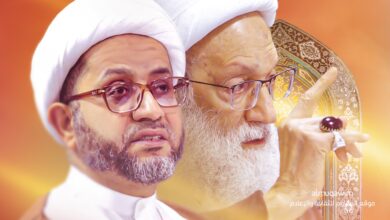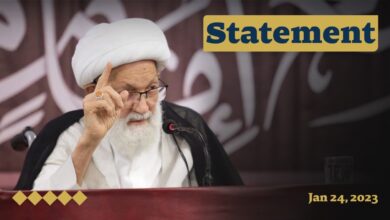Ayatollah Isa Qassim: The value of the dialogue derives from the reforms it achieves.
Ayatollah Isa Qassim: The value of the dialogue derives from the reforms it achieves.
The second part of Friday Prayers Sermon for Ayatollah Shaikh Isa Ahmed Qassim Imam of the Grand Mosque in Duraz (Imam Al-Sadiq Grand Mosque) 25th January 2013.
Bahrain reform and dialogue
In an interview with the Minister of Interior on Tuesday 22nd January 2013, he said “legal and constitutional demands are welcomed. Such demands always attract the interests and follow up of the wise leadership as the aim of the reform is to achieve a decent and safe life for Bahrain’s people, to feel their needs and meet their demands. We aim at the comprehensive development of the country to achieve prosperity and development. Therefore democracy must be a comprehensive national affair for all and factional or sectarian democracy is not a national choice”.
It is a nice speech and compatible with the popular demand. If these words had been on the way of being applied or activated, there would have been no problem. The dispute and talks would have ended if there had been seriousness in applying and activating these words.
If democracy had found its way on the ground, if people had played role in choosing the policies that govern them, if they had had the right of free and fair election, if their opinion regarding the formation of their government had been respected, if their vision had been considered when establishing the constitution, the main demand of people would have been met and there would have been no dispute since people do not want any thing other than this.
As for factional or sectarian democracy, you cannot attribute it to those people who call for one vote for each citizen without discrimination.
The factional or sectarian democracy – as it is said in the interview – is only achieved when one vote of citizen is given a legal value in the elections that make his voice equal to ten voices or even dozen voices in a way that it contradicts the scale of citizenship and equality.
As for the issue of dialogue, it has already been said more than once that dialogue is only a way that might give birth to something or not. The value and importance of the dialoguederives not from itself but from the reforms and the solutions of the problem it achieves.
The dialogue might be fruitful if there is behind an intention for reform and if it has been provided with elements and conditions lead to its success. However, dialogue might cause more failure and disagreement and get away from the correct aim which is reform – if it is provided with objectives that do not meet reform.
There are also many questions related to the issue of the dialogue …
– Is there a confession of the existence of a serious problem that deserves a serious dialogue? Since we always hear that things are all fine!
– Will the scheme of dialogue be designed and engineered by the authority alone? Or will the authority have a partner from the opposition?
– It is said that this dialogue is an extension of the previous dialogue – which had been a failure – so, will this dialogue have the nature and descriptions of the previous dialogue? Will it have the same extent of the previous one?
– Who chooses the representatives of this people as all the people are interested in this matter, as it is a public matter in which people suffer from exclusion and deportation.
– Who are the parties involved in the dialogue? Is the dialogue between parties from the people? Or is it between the government and the people? What solutions people have in their hands? Is there a party in the people that took rights from another party so we can say there have a dialogue about this shared and common thing? Is there any sect that took away and stole the rights of another sect – so we can say there will be a dialogue between this sect which took the rights away from the another which is supposed to be the side whose rights are stolen and taken from.
The fact is that authority is the one which seizes the rights people. People only demand their rights which the government took forcibly, therefore the issue of the dialogue should be between the government and people.
– If the parties in the dialogue are appointed by the authority, what is the measure of such appointment? What is the followed measure in choosing the number of representatives of this society or than one – since there is a society represents one hundred citizens while the other represents ten of thousands people.
– What is the stance of the hundreds of thousands of citizens who took to the streets in mass marches – for example the March Rally – towards dialogue? Are their opinions included in thedialogue’s considerations or the results of this dialogue will be applied on them as if they are only considered sheep?
– If twenty representatives – for example – participated in the dialogue to show a particular point view and those twenty represent 40 thousand citizens while ten representatives participate in the dialogue – yet they represent two hundred thousand citizens, for whom the superiorly would be- as we want to be close from comprehending democratization and democratic understanding.
– What is the time limit for dialogue? To what extent the ability of the dialogue’s results – if any – could convince people and achieve their satisfaction? What are the guarantees of implementing the result?
Finally, if this dialogue is intended to exit the country from the crisis it is living – this political crisis which puts pressure on all its situations and affect all the parties – , the solutions which will come from this dialogue should be agreed by the people since they are the second party in this conflict and they are owners of this movement – as they presented martyrs, prisoners, tortured and dismissed people, injured and wounded ones. This people sacrificed more and more and they are the ones who suffered from the policies of exclusion, marginalization, and deprivation. The political societies are not all the people but a part from them as those societies cannot decide instead of people or remove their will.
If the dialogue is destined to end with satisfactory results for its parties, these results will not be capable of acquiring the national consensus in the true sense and image that represents a solution to the crisis and a way out of the impasse except with the consent of the people.
We hope that there is a determination and planning for a successful dialogue which is conducive to results that represent a fair solution based on the opinion of the people and their approval and which will keep this homeland and its interests safe.


